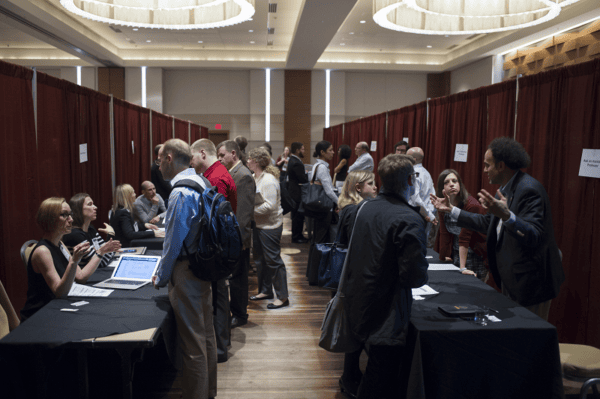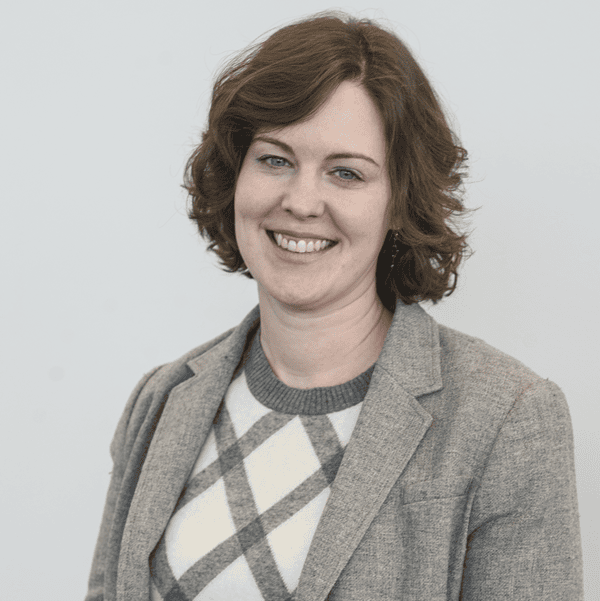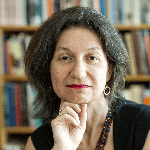
The Career Fair at the 2016 annual meeting created a space for job candidates and students to meet and seek advice from historians who enjoy careers beyond the professoriate. The AHA’s Career Diversity for Historians initiative will sponsor another Career Fair in Denver. Marc Monaghan
The last several years have seen an increase in the professional development opportunities for graduate students and early career historians at the AHA’s annual meeting. The 2017 meeting promises to continue the trend, bringing back popular events from the past and piloting new ones designed to expand the range and definition of career development. A full description of all events can be found in the annual meeting program.
As before, the AHA’s Professional Division has organized a series of workshops and roundtables aimed at graduate students and early career historians. The Job Workshop for Historians offers the opportunity to present and get feedback on job materials—from academic cover letters to interview questions to business-ready résumés—from volunteers representing a range of institutions in higher education, as well as secondary schools, museums, and other organizations of interest to historians.
Graduate students at all stages of study are also invited to attend a series of panels on careers and career paths. The Many Careers of the History PhD will once again feature historians who have found success beyond the professoriate speaking about their career paths. Careers Serving Policymakers and the Public, sponsored by the Society for History in the Federal Government, will offer insight on a career path many historians choose. Deciphering the Academic Job Search will present the perspectives of a candidate, a search committee member, and a dean, and Roundtable on Transitioning to the Professoriate will feature historians who have found varied routes to tenure-track employment. The Professional Division will also sponsor the roundtable Historians and Work-Life Balance.
The AHA’s Career Diversity for Historians initiative will sponsor the fourth annual Career Fair in Denver. Over the last several years, the Career Fair has been increasingly popular, with overall attendance growing each year. For 2017, we’re bringing back experienced Career Fair advisers and recruiting others from the Denver area and the western United States. A wide swath of historians who enjoy careers beyond the professoriate serve as advisers, as do representatives from employers that are likely to value trained historians. In the past, advisers have hailed from such sectors as business, academic administration, independent schools, historical societies, government, and publishing. In addition, Career Diversity will again sponsor “Ask an Assistant Professor,” a booth in high demand at last year’s Career Fair. It highlights the range of work required of assistant professors, which for many graduate students seeking tenure-track jobs is often shrouded in mystery.
While awareness of the variety of careers open to historians is increasing, evaluating “fit,” or the match between career path and individual goals and desires is not as widely discussed. Three sessions approach this question in Denver. Position and Mission: Women of Color Historians’ Career Considerations and Implications considers this issue in “terms of research, mentor-teaching agendas, and work-life integration.” The Committee on Lesbian, Gay, Bisexual, and Transgender History has also organized Queer Scholars and Scholarship on the Job Market.
To help graduate students and job seekers make the most of the AHA’s Career Fair, Career Diversity is sponsoring a pre-fair workshop, led by Annie Maxfield, associate director of graduate student relations and services at the University of California, Los Angeles, Career Center, titled Decoding Work: Aligning Values and Career. Based on a successful workshop at the Career Diversity regional conference “Futures of History” at UCLA, the workshop at the annual meeting will help graduate students identify their unique strengths and values, and how to use this insight to decode job descriptions and identify concrete starting points to explore possible career paths.
The AHA’s Professional Division and Career Diversity for Historians have also cooked up some new offerings on this year’s professional development menu. Career Diversity is excited to partner with the Modern Language Association’s Connected Academics project, a parallel initiative also funded by the Mellon Foundation, to offer Candid Conversations: Mentorship in the Humanities. Based on the University of California Humanities Research Institute’s successful online series “Candid Conversations,” the panel will use a series of short, prerecorded videos as “pre-text” for a roundtable discussion on the value of and best practices for mentorship during and after graduate school. Audience comment will be a central aspect of the conversation. (A parallel panel is scheduled for the MLA convention, and the two panels will be linked via a Twitter feed.)
Several workshops and sessions will focus on concrete skills early career historians can employ both inside and beyond the professoriate. History graduate students frequently find internships useful for evaluating future career paths, both academic and nonacademic. Led by graduate students from Career Diversity pilot programs at the University of New Mexico, UCLA, the University of Chicago, and Columbia University, History Engagement: Four Career Diversity Models for Developing History Doctoral Internships will outline successful strategies for securing internships while in graduate school and making the most of the experience. Both faculty and graduate students are invited to attend “Mellonizing” the Seminar: Applying the AHA’s “Five Skills” to Graduate Education, where representatives from one Career Diversity pilot site, the University of New Mexico, will share ideas for translating the “five skills”—communication, collaboration, intellectual self-confidence, quantitative literacy, and digital literacy—into graduate curricula.
Finally, the Denver meeting will feature a robust cadre of sessions focused on rethinking and redefining how historians can develop and use communication skills. The ability to communicate to a variety of audiences in a variety of media, frequently under time pressure, is a valuable resource history PhDs can offer to potential employers. The Professional Division will again offer its Q&A with Publishers and this year will introduce a similar Q&A with Journal Editors. Attendees can also take part in the conversation at Authors and Their Work in the Brave New Worlds of Scholarly Publishing. A pair of panels, jointly titled “Writing History,” will highlight the range of publishing challenges and opportunities beyond scholarly publishing, first in Writing for Readers in the 21st Century—For Love, Money, and Applause, and then in Genre-Busting History. Finally, Say It Like You Mean It: Graduate Education and Creative Expression in Thinking, Making, and Doing History will examine how and why graduate students can and should think creatively about their scholarly work and develop the tools to disseminate it to a wide and varied audience.
For more information on these sessions and resources on career development at the annual meeting, please see our web guide.
This work is licensed under a Creative Commons Attribution-NonCommercial-NoDerivatives 4.0 International License. Attribution must provide author name, article title, Perspectives on History, date of publication, and a link to this page. This license applies only to the article, not to text or images used here by permission.




